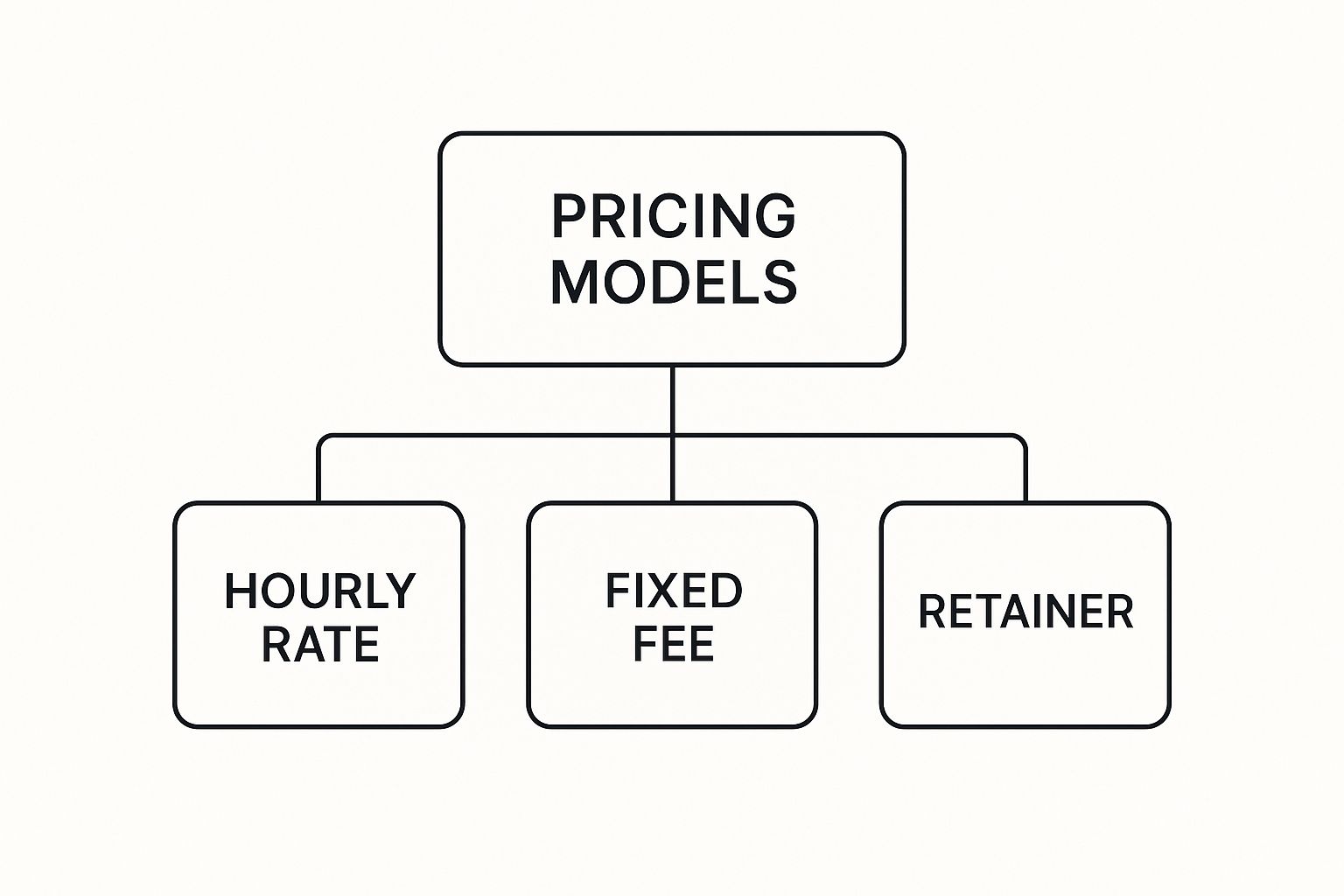So, you're thinking about hiring a private investigator but are naturally wondering about the cost. It's a common and sensible question. In the UK, you can expect to pay anywhere from £45 to £85 per hour for a private investigator, but that's just a ballpark figure. The actual rates can swing from as low as £30 to over £150 an hour, depending on what you need and who you hire.
This guide will walk you through exactly what goes into that final price.

A Clear Overview of UK Private Investigator Costs
Trying to pin down the cost of a private investigator is a bit like asking how much it costs to hire a solicitor or a specialist builder. The answer is always, "It depends." You're not just buying a product; you're investing in a professional's expertise, their time, and the resources they need to get you the right answers. The final bill is never just one number—it's a reflection of the case's complexity, the investigator's experience, and the hours required.
Think about it this way: a simple task like finding someone's current address is relatively quick and straightforward. On the other hand, conducting a week-long surveillance operation to investigate a partner's suspected infidelity is a much more involved and time-consuming undertaking. The first might be offered as a fixed-fee service, whereas the second will almost certainly be billed by the hour.
If you're new to this, it helps to first understand the full scope of their work. You can learn more about what a private investigator does in our in-depth article.
Typical UK Private Investigator Costs at a Glance
To give you a clearer idea of what to expect financially, here’s a quick summary of typical costs for some of the most common services across the UK. Think of these as a starting point. Any reputable agency will always provide a detailed, transparent quote tailored specifically to your situation before any work begins.
Typical UK Private Investigator Costs at a Glance
| Service Type | Average Cost Range | Pricing Model |
|---|---|---|
| Surveillance | £45 – £85 per hour | Hourly Rate |
| Tracing a Person | £150 – £600+ | Fixed Fee |
| Background Check | £250 – £800+ | Fixed Fee |
| Vehicle Tracking | £350 – £750 per week | Fixed Fee |
| Bug Sweeping | £400 – £1,500+ | Fixed Fee |
As you can see, the pricing models vary quite a bit. Hourly rates for private investigators in the UK can be quite different from one agency to the next, reflecting the variety of services and even regional price differences. While most industry sources put standard hourly fees somewhere between £45 and £85, you'll find some starting as low as £29.50 per hour.
Generally, you can expect the industry average to sit around the £50 to £55 mark, though you'll almost always find that rates are higher in London. Having this overview upfront should help you set a realistic budget and know what to expect.
Understanding How Investigators Structure Their Fees
When you first start looking into the cost of a private investigator, you'll quickly notice there's no single price tag. The way an investigator charges for their work is directly tied to the job itself. Some tasks have a very clear start and finish, while others are far more unpredictable, meaning different pricing models are needed to be fair to both you and the investigator.
Getting your head around these models is the best way to manage your budget and understand exactly what you're paying for. You'll almost always come across one of three structures: hourly rates, fixed fees, or retainers. Each is a better fit for different kinds of investigative work, from a simple records check to a complex, long-term surveillance operation.
This diagram breaks down the core pricing models that nearly all private investigators use.

As you can see, all investigator pricing is built on one of these three foundations, chosen based on what your specific case demands.
The Hourly Rate Model
Think of an hourly rate like calling out a specialist tradesperson for a tricky problem you can't pin down. You're paying for their time and expertise because no one knows for sure how long the job will take. This model is perfect for jobs where the timeline is a bit of an unknown.
- Best for: Surveillance, tracking someone's movements, or infidelity investigations.
- Why it's used: These cases are fluid and can change direction in an instant. An investigator might get the evidence they need in a couple of hours, or it could take several days of patient observation.
The hourly rate simply covers the operative's time on the ground. In the UK, you can expect this to be somewhere between £45 and £85 per hour. It’s a straightforward approach that means you only pay for the time actually spent on your case.
The Fixed Fee Structure
A fixed fee is much more like ordering from a set menu—you know precisely what you're getting and exactly what the bill will be at the end. This pricing is reserved for standard, well-defined tasks where the investigator knows the process inside and out.
A fixed fee gives you total clarity from the outset. It takes away any worry about a spiralling bill, which is why it's so popular for routine services where the scope of the work is crystal clear.
You’ll often see fixed fees offered for services like:
- Background Checks: A standard procedure for verifying someone's history.
- Tracing a Person: Finding a specific individual, usually with a last known address to start from.
- Fitting a Vehicle Tracker: A one-time task with a clear outcome.
The Retainer Agreement
A retainer acts as a down payment, essentially securing the investigator's time and resources for your case. It's very similar to how you might engage a solicitor for a complex legal issue. You pay an agreed amount upfront, and the investigator then deducts their hourly fees from this balance as they work.
This approach is standard for bigger, more involved cases that are likely to stretch out over weeks or even months. It gives the investigator the commitment they need to dedicate significant resources to you. If there's any money left over at the end of the investigation, it's typically refunded. For a deeper dive into the hiring process, our complete guide on how to hire a private investigator in the UK is a great resource.
What Really Drives the Final Investigation Cost

When you get a quote from a private investigator, that final number isn't just pulled out of thin air. It’s a careful calculation based on several key elements that reflect the expertise, time, and resources needed to get you answers. Getting to grips with these factors helps you understand exactly what you're paying for.
Think of it like hiring any other highly skilled professional. A former Scotland Yard detective with 20 years of experience is naturally going to command a higher rate than an investigator who is just starting out. That wealth of experience isn't just for show; it often means your case gets solved more quickly, efficiently, and with a higher chance of success.
The skills involved become clearer when you look into the full scope of what a private investigator can legally do. The services are incredibly varied, and each has its own pricing structure.
The Complexity of the Case
By far the biggest influence on the cost is the nature of the job itself. A straightforward task, like finding a person's current address, is a world away from a sprawling corporate fraud investigation that might require digital forensics, a team of agents, and weeks of covert surveillance.
- Simple Tasks: A basic background check or a quick database search can often be done for a lower, fixed fee because it takes minimal time and resources.
- Complex Cases: Investigating a cheating partner, for example, could involve many hours of surveillance, vehicle tracking, and producing a detailed evidence report, which drives the cost up.
- Highly Complex Cases: Tackling corporate espionage or tracing hidden assets is the top tier. These jobs can span multiple jurisdictions, involve specialist tech, and require a whole team, placing them at the highest end of the price range.
The Investigator's Experience and Background
Just like in any profession, experience pays. An investigator with a background in the police, military intelligence, or another specialised field brings a unique and valuable skill set to the table, which justifies a higher rate. You’re not just paying for their time; you’re paying for their hard-earned ability to analyse situations, gather court-admissible evidence, and operate with total discretion.
The cost of hiring a private investigator in the UK is shaped by several key factors. Investigator experience is a major determinant—those with extensive backgrounds in law enforcement or specialised fields often command higher rates, sometimes exceeding £100 per hour. The complexity of the case also plays a significant role; straightforward tasks are less expensive than surveillance or fraud investigations, which demand more time, skill, and resources. Discover more insights about investigator costs on Tremark.co.uk.
Location and Urgency
Where the work happens matters. The operational costs for an investigator working in Central London—things like fuel, parking, and other expenses—are simply much higher than in a quiet rural village. This geographical difference is a standard factor that will be reflected in the final bill.
Urgency also comes at a price. If you need an investigator to drop all their other commitments and start on your case immediately, expect to pay a premium. This charge covers the disruption to their schedule and the need to re-prioritise their entire caseload to meet your urgent needs. The more resources required, from extra agents to specialist equipment, the more these will add to the total cost.
What Else Am I Paying For? A Look at Additional Investigation Costs
Getting a handle on the hourly rate is a solid first step, but it doesn't paint the whole picture. When you're trying to figure out the total cost of hiring a private investigator, you need to think about the other expenses that will inevitably crop up. These aren't sneaky "hidden fees" – they're simply the practical, operational costs of getting the job done right.
I often tell clients to think of it like building a house. The architect's fee is just one part of the budget; you still have to account for the price of bricks, timber, and labour. In the same way, an investigator's hourly rate covers their time and skill, but the actual legwork of an investigation has its own set of costs. Knowing what these are upfront helps avoid any nasty surprises when the final bill arrives.
Common Additional Costs in an Investigation
If your case requires any kind of fieldwork or surveillance, you can be sure that travel expenses will be a factor. These are the direct costs associated with the investigator being out on the road, working on your behalf.
You can typically expect to see things like:
- Mileage: Most investigators charge a standard rate per mile to cover fuel and the general wear and tear on their vehicle. This is usually around 45p per mile.
- Travel Time: The time it takes for an investigator to get to and from a location is billable work. Some may charge this at a slightly reduced hourly rate, but it's still part of the job.
- Accommodation & Meals: For cases that span several days or require overnight surveillance, the cost of a basic hotel room and reasonable meals will be factored in.
My best advice is to ask for a complete breakdown of all potential costs before you agree to anything. A professional, transparent investigator will have a clear fee schedule and will walk you through every possible charge, so you understand exactly what you're paying for.
Of course, travel is just one piece of the puzzle. The specific nature of your case will determine what other resources are needed. For instance, some investigations demand access to specialist databases or technology. A common request is finding out who is behind an unknown phone number; our detailed guide on tracing telephone numbers in the UK explains the process for that kind of specialised work.
Other services can also add to the final invoice. A straightforward UK address trace might start at £75 plus VAT, but if you need it done urgently within 72 hours, the price could jump to £200. For something much more involved, like a comprehensive report on someone's assets, you could be looking at a cost of £550 or more. You can see more examples of these variable costs on Bark.com.
Here's a quick rundown of some other common expenses that might be added to your base rate.
Common Additional Costs in an Investigation
| Expense Category | Description | Typical Cost Example |
|---|---|---|
| Database & Record Fees | The cost to access restricted databases or purchase official documents, such as Land Registry files or court records. | Varies by source, from a few pounds to over £100 per search. |
| Specialist Equipment | Charges for using specific gear like covert cameras, GPS tracking devices, or advanced surveillance equipment. | Billed as a flat fee per day or for the duration of the case. |
| Administrative Charges | The time and effort required to compile evidence, write detailed reports, and prepare files suitable for court. | Often a fixed fee or billed at an administrative hourly rate. |
| Third-Party Services | Costs for subcontracting specialists, such as forensic accountants or digital security experts, for specific tasks. | Billed at the third party's standard rate, passed through to the client. |
These aren't just add-ons; they are the essential tools and resources that allow an investigator to gather the information you need effectively and legally.
How to Manage Your Investigation Budget Effectively

Hiring a private investigator is a serious investment, but it doesn't have to be a financial black hole. With a bit of planning, you can get the answers you need without the bill spiralling out of control. The most effective way to keep costs in check, by far, is to start with absolute clarity.
Think of it like giving a taxi driver a destination. If you just say "drive," the meter will run indefinitely. But if you give them a specific address, they can plot the most direct route. It's the same principle here: giving your investigator a clear, defined objective prevents them from wasting time on dead ends, which ultimately saves you money.
Set Clear Objectives from the Start
Before you even pick up the phone, sit down and figure out exactly what you want to achieve. What specific question must be answered? What single piece of evidence is crucial for your case?
Being precise helps the investigator focus their efforts where they matter most. A vague goal like "find out what my partner is up to" is a recipe for a very high bill. In contrast, a specific objective such as "confirm if my partner visits this particular address between 4 pm and 7 pm on weekdays" gives them a clear, actionable task to execute.
Being well-prepared is the single most effective way to reduce the overall cost. The more information you can provide upfront—names, addresses, vehicle details, daily routines—the less time the investigator has to spend on preliminary research, saving you money.
To make this process smoother, it helps to understand what separates a reliable professional from the rest. Our guide on how to find a good private investigator offers some excellent pointers on what to look for.
Practical Steps for Budget Control
Once your objectives are crystal clear, you can take several practical steps to actively manage the costs as the investigation unfolds.
-
Request a Detailed Contract: Never, ever proceed without a written agreement. It should clearly outline the scope of the work, the pricing structure (hourly rate or fixed fee), and a full breakdown of any potential extra expenses. This document is your financial safeguard.
-
Be Upfront About Your Budget: Don't be shy about discussing your financial limits. A true professional can often tailor their strategy to fit your budget, suggesting the most high-impact actions to take first.
-
Ask for Regular Updates: Set an expectation for periodic progress reports. This allows you to monitor how your budget is being used in real-time and make informed decisions about whether to continue, pause, or change the investigation's direction.
-
Compare Quotes Intelligently: It’s wise to get quotes from a few different agencies, but resist the temptation to simply choose the cheapest one. An unusually low price can be a red flag for inexperience or poor service, which could cost you far more in the long run if the job isn’t done right. Focus on value and transparency, not just the bottom-line figure.
So, Is It a Cost or an Investment?
When you’re trying to find answers, hiring a private investigator feels less like an expense and more like an investment. An investment in finding the truth, gathering critical evidence, or simply getting the peace of mind you need to move on. As we've seen, figuring out "how much does a private investigator cost" isn't about finding one single price tag.
The final bill is a blend of factors. It’s shaped by how complex your situation is, the years of experience the investigator brings to the table, and the way they structure their fees—be it hourly, a fixed rate, or a retainer.
Getting to grips with the difference between these pricing models is your best tool for managing the budget. It's also wise to remember that things like travel, court time, or specialised database searches can add to the total, so it's always best to ask about them upfront. The aim isn't just to find the cheapest service, but to find the one that delivers genuine value.
Ultimately, your goal should be to find a credible, professional investigator who is upfront about costs and keeps you in the loop. The right expert doesn't just hand you a report; they deliver a resolution.
Use what you've learned here to have a confident conversation with any potential investigator. Ask the right questions. This will help you find someone who not only fits your budget but truly understands what you need to achieve. By choosing wisely, you’re ensuring every pound you spend works towards getting the answers you're looking for.
Frequently Asked Questions
It’s completely normal to have questions when you’re thinking about hiring a private investigator for the first time. The whole process can seem a bit mysterious. To help clear things up, I’ve answered some of the most common queries we get about legality, payments, and making sure you’ve found a credible professional.
Is It Legal to Hire a Private Investigator in the UK?
This is probably the number one question people ask, and the answer is a straightforward yes, it is perfectly legal. However, there's a big caveat: the investigator must operate entirely within the law.
A true professional knows the legal landscape inside and out. They understand the strict boundaries set by legislation like the Human Rights Act and GDPR. This isn't just about ticking boxes; it's about ensuring any evidence they gather is obtained ethically and will actually be admissible in court if your case goes that far.
How Do I Pay a Private Investigator?
Most professional agencies don't ask for the full fee upfront. Instead, you'll typically be asked for a retainer.
Think of it like a deposit or putting money on account with a solicitor. This initial payment secures the investigator's time and covers their initial costs, and they'll bill their hourly work against it. This is a standard and fair practice that shows a commitment from both sides. Always make sure the retainer and hourly rate are clearly stated in your contract before signing anything.
One of the most important things to grasp is that you are paying for an investigator's time, resources, and professional expertise—not for a guaranteed outcome. The evidence is what it is, and a reputable professional will never promise to find a specific result for you.
Their job is to follow the trail wherever it leads and report their findings honestly. Understanding this from the start helps set realistic expectations for the investigation.
How Can I Check If an Investigator Is Legitimate?
With no government licensing for private investigators in the UK, it’s absolutely vital you do your own due diligence. You need to be sure you're hiring a genuine professional, not a cowboy operator.
Thankfully, there are a few simple checks you can do to give yourself peace of mind:
-
Professional Memberships: Are they a member of a respected industry body like the Association of British Investigators (ABI)? Membership isn't just a logo on a website; it means they are vetted, insured, and adhere to a strict code of ethics.
-
ICO Registration: Anyone handling personal data legally must be registered with the Information Commissioner's Office (ICO). You can—and should—look them up on the official ICO register to confirm they're compliant.
-
Reviews and Reputation: What are past clients saying? While this line of work is confidential, established investigators often have testimonials or case studies. Look for genuine feedback that speaks to their professionalism and effectiveness.
Taking a few minutes to perform these checks ensures your sensitive case is in the hands of a skilled, trustworthy professional who will handle it with the care it deserves.
At UK Private Investigators, we believe that trust starts with transparency. If you have more questions or just need some confidential advice on your situation, our experienced team is here to listen. Contact us today to discuss your case with a discreet professional.

